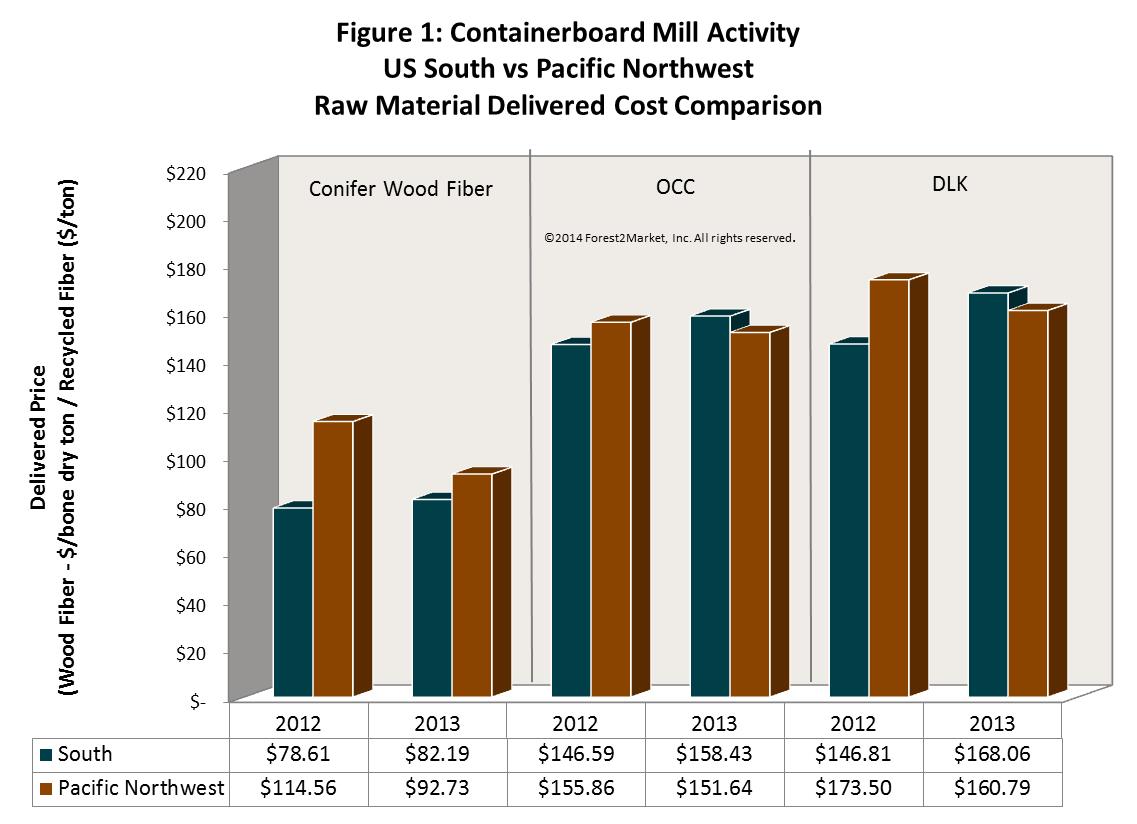

Conifer Wood Fiber
Conifer wood fiber¹ costs in the two regions moved in opposite directions year over year. US South delivered prices were up 4.6 percent or $3.58 per bone dry ton (BDT) while Pacific Northwest prices were down $21.83 per BDT, a 19.1 percent decrease. US South average wood fiber prices for the year were 88.6 percent ($82.19) of the cost of the Pacific Northwest average of $92.73 per bone dry ton.
Delivered prices for old corrugated containers (OCC) followed the same pattern. US South prices increased $11.84 per ton, or 8.1 percent. US South OCC prices were higher than in any other region in 2013. In the Pacific Northwest², OCC prices decreased $4.22 per ton (-2.7percent).
In 2012, when China was more active in the OCC market, OCC prices in the Pacific region were higher than they were in the South. In 2013, this shifted. In 2012, southern delivered prices were 94 percent of the PNW average of $155.86 per ton. For 2013, southern delivered prices averaged $158.43 per ton or 104.5 percent of the Pacific Northwest average.
For double-lined, kraft corrugated cuttings (DLK), US South prices increased by $21.25 per ton (14.5 percent). In the Pacific Northwest, prices decreased $12.71 per ton (-7.3 percent). Pacific Northwest DLK prices averaged $160.79 per ton, 96 percent of the cost of the South average of $168.06 per ton.
Product Mix and Average Price per Ton of Output
Forest2Market collects pricing data for wood fiber (through its Forest2Mill delivered raw material benchmark) and recovered fiber (through its Market2Mill recovered fiber benchmark). By combining these resources, we can take a more granular look at product mix; Figure 2 combines wood fiber and recycled fiber into a composite raw material cost.³

In the US South, the product mix for 2013 containerboard production was:
- 71.5 percent virgin wood fiber (a change of -1.3 percent over 2012)
- 23.1 percent OCC fiber (a change of 4.2 percent over 2012)
- 5.4 percent DLK fiber (a change of 0.5 percent over 2012)
The product mix for northwestern containerboard production was:
- 58.7 percent wood fiber (a change of 3.7 percent over 2012)
- 35.6 percent OCC fiber (a change of -7.4 percent over 2012)
- 5.7 percent DLK fiber (a change of 16 percent over 2012)
Based on the composite delivered price, southern mills experienced a $7.69 per BDT increase in raw material costs (7.5 percent) to average $109.48 per ton in 2013. In the Pacific Northwest, the composite delivered price averaged $124.59 per ton in 2013, a decrease of $16.34 per ton (11.6 percent).
Despite seeing higher raw material costs across all three products, US South containerboard mills were still advantaged compared to Pacific Northwest mills; costs there were 87.9 percent of the Pacific Northwest’s.
¹Conifer wood fiber for the US South includes pine pulpwood in chip equivalent volume combined with pine chipmill, in-woods, and residual chip volume – i.e. all pine wood fiber volume. For the Pacific Northwest this includes all chipped pulpwood, chipmill, in-woods and residual chip volume for Doug Fir, Hemlock, True Fir and pine species.
²Includes California.
³Composite product mix for both regions includes 100 percent recycled fiber mills.


 Daniel Stuber
Daniel Stuber


